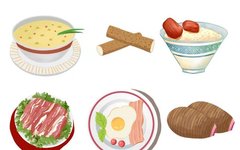01What is Qi Deficiency?
Qi deficiency, as the name suggests, refers to a lack of Qi in the body. As the saying goes, “A person lives by a breath of Qi,” which is akin to the “engine” of the human body. When a person experiences Qi deficiency, the “engine” lacks power, leading to a weakening of physiological functions and resulting in a Qi deficiency constitution.
02What are the Symptoms of Qi Deficiency Constitution?
The primary characteristics of individuals with a Qi deficiency constitution include shortness of breath, fatigue, and excessive sweating. In Traditional Chinese Medicine (TCM), it is said that “the lungs govern Qi,” so Qi deficiency first affects the lung’s respiratory function, leading to shortness of breath and a feeling of weakness when speaking. During physical activity, they may experience breathlessness; individuals with Qi deficiency often feel fatigued and lack energy due to the weakness of Qi, making it difficult to maintain high-intensity activities. Additionally, those with Qi deficiency are prone to excessive sweating and frequent colds. Qi has a role in securing and defending the body, helping to retain sweat on the surface. When Qi is deficient and cannot secure, excessive sweating occurs. Furthermore, individuals with Qi deficiency may exhibit soft muscles, poor appetite, introverted personality, and slow recovery after illness. Observing the tongue and pulse reveals a pale red, swollen tongue with tooth marks on the edges, and a weak, slow pulse.
03How to Regulate Qi Deficiency Constitution?
The key to regulating Qi deficiency constitution lies in “tonifying Qi and nourishing Qi.”
1. Dietary Adjustments: It is essential to maintain adequate caloric intake and consume nutrient-rich, easily digestible foods to provide energy for the body, which is transformed into Qi and blood for the five organs. Many young women today are keen on dieting and excessively restrict their food intake, avoiding meat and staple foods. Over time, this can damage the body’s Qi, leading to Qi deficiency. Additionally, one should consume more foods that tonify Qi and strengthen the spleen, such as japonica rice, millet, glutinous rice, yam, jujube (Da Zao), shiitake mushrooms, lentils, chicken, beef, eggs, and peanuts, while limiting foods that deplete Qi, such as radishes, water spinach, and betel nuts.

2. Moderate Exercise: TCM believes that “prolonged lying injures Qi.” If one does not exercise for a long time, the movement of Qi becomes sluggish, leading to weakness. Therefore, it is important to engage in moderate exercise, choosing relatively gentle fitness methods such as Ba Duan Jin (Eight Pieces of Brocade), Tai Chi, or brisk walking to promote the flow of Qi in the body.
3. Balance Work and Rest: TCM states that “labor consumes Qi,” so it is crucial to maintain an appropriate level of work intensity and avoid overexertion. During breaks from work or study, learn to relax and engage fully in work with a refreshed attitude, which can also improve work efficiency.
4. Adjusting Mindset: Individuals with Qi deficiency often lack positive energy and have a negative mindset. Since “sadness affects the lungs” and “sadness depletes Qi,” excessive sadness and worry can damage the physiological functions of the lungs and spleen, hindering the generation and movement of Qi. Therefore, cultivating an optimistic and open-minded attitude, developing hobbies that bring joy, and fostering a love for nature and life can help alleviate symptoms of Qi deficiency.
5. Acupoint Health Care: One can also use acupoints that tonify Qi and strengthen the spleen for health care, such as Zhongfu (肺俞), Zusanli (足三里), Qihai (气海), Guanyuan (关元), Feiyu (肺俞), and Piyu (脾俞). Regularly massaging these acupoints can have a beneficial effect on tonifying Qi.
Source: Health Shandong

